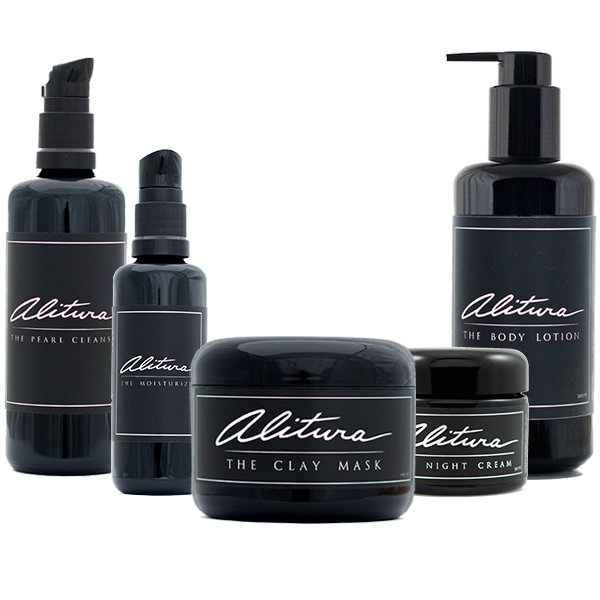How to Balance Progesterone Levels for Glowing Skin
Lackluster hair and dull skin are some of the undesirable consequences of hormonal imbalance. If one of your goals is to reverse these visible signs of aging, then learning about your hormones is essential.
Hormones are the chemical messengers of the body, affecting every physiological function imaginable. They dictate the rate of metabolism, energy production, immune responses, inflammation, cellular growth/repair and of course the health of the skin and hair.
Ultimately, every hormone in some way or another affects our physical appearance. Of all hormones, progesterone is one of the most important to consider. In this article, we will discuss the involvement of progesterone in skin aging as well as methods for balancing its levels to achieve more radiant, youthful-looking skin.

Progesterone & Skin Wellness
Progesterone is known as the fertility hormone and the word literally means “for pregnancy”. However, progesterone has many added benefits beyond its fertility effects. In fact, the elevated levels of progesterone in pregnancy greatly improves hair and skin radiance. This is what is majorly responsible for the “pregnancy glow”.
There are a few ways in which this revitalizing hormone is responsible for maintaining youthful skin. First off, progesterone has protective, anti-stress effects, which prevents the skin from becoming damaged by stress.
Additionally, progesterone assists in the secretion of thyroid hormone, which is essential for skin health. The thyroid drives healthy circulation, ensuring the skin is receiving the necessary blood, oxygen, and nutrients it needs to glow.
Progesterone also regulates sebum production, the skin oil that provides not only moisture but also protection and immunity from toxins and pathogens. When progesterone levels decline, thyroid function tends to decrease resulting in dry skin that is more sensitive to damage.
A progesterone deficiency tends to occur with age and stress. In general, it contributes to most, if not all, of the visible manifestations of aging. Therefore, correcting a progesterone deficiency can have a profound beneficial impact on the health and appearance of the skin and hair.
Low Progesterone & Cortisol
As we’ve discussed before, stress is directly damaging and aging to the skin. Various sorts of stress, be it emotional stress, physical stress, or even exercise stress can stimulate the production of the classic stress hormone cortisol, which is known to age the skin.
In fact, cortisol can directly catabolize skin tissue and interfere with tissue regeneration, which can lead to wrinkling and skin aging. Studies have found that elevated cortisol levels can result in collagen loss in the skin and contribute to weak, thin, and sagging skin.
Aside from reducing stressful experiences, one of the most effective ways to keep cortisol to a minimum is to ensure optimal progesterone levels. This is because progesterone can actually counteract cortisol by serving as the primary anti-stress hormone. However, during a progesterone deficiency, there is an increased production of cortisol.

Progesterone, Estrogen & Skin Aging
Another way progesterone affects your skin is through its relationship to estrogen. Progesterone regulates estrogen and when the body is healthy, it outnumbers estrogen 50-100:1. However, in stress and aging or a progesterone deficiency, estrogen can outnumber progesterone. This is a condition known as “estrogen dominance,'' which can cause skin and health problems.
Although considered a “female hormone” estrogen’s actions in the body are more akin to a stress hormone. For example, estrogen can stimulate the adrenal glands by way of the pituitary to secrete cortisol. Estrogen also impairs the secretion of thyroid hormone and opposes progesterone, much like other stress hormones do. Also, like other stress hormones, estrogen levels rise with aging, whereas progesterone levels decline. 1
In regards to skin aging, an excess of estrogen (which can be brought on by low progesterone) can contribute to thinner and less elastic skin that tends to be wrinkled and saggy. One way estrogen has this effect is by contributing to edema (water retention) by increasing the skin cell's affinity to water.
Estrogen can also contribute to hypoxia (oxygen deprivation) by stealing oxygen from the mitochondria. Combined, the water-logging and oxygen deprivation of the skin cell can lead to inflammation, oxidative stress and skin damage. 2, 3
Correcting Low Progesterone for Healthy Skin
Fortunately, there are simple changes one can implement to correct progesterone deficiency and restore skin youthfulness. Here are a few things to consider:
Eliminate Phytoestrogens
As discussed, estrogen opposes progesterone, so reducing estrogen levels can help to regulate progesterone. One simple way to do this is to reduce or avoid the intake of phytoestrogens, such as flaxseed, soy, legumes/beans, and polyunsaturated oils.
Ashwagandha
One of the featured herbs in our Revitalize formula is Ashwagandha, and for good reason. Aside from its anti-cortisol effects, studies have found that the use of ashwagandha can increase sex hormones and gonadotropins – especially testosterone and progesterone levels. 4
Ditch Conventional Skin Care
Most commercial skincare products contain known xenoestrogens, which are chemicals that mimic estrogen in the body. These are compounds (including parabens, phthalates, and stearate) that you'll see in industrial personal skincare products.
As mentioned, estrogens oppose levels of progesterone, which is likely the reason for the antifertility effects associated with their use. The best way to avoid this is to only use truly natural, non-toxic skincare products. 5
Reduce Stress
When we say stress, we are referring to any counter-force that offsets the natural homeostasis of the body. This includes dietary, chemical, physical, mental/emotional and environmental stressors. So reducing stress takes more than just meditating for a few minutes a day. However, focusing on quality sleep, deep relaxation and addressing mental and emotional are all essential to maintaining healthy progesterone levels. To learn more about natural skincare and maintaining optimal health, download our e-book below.

The Natural Path to Perfect Skin
30 PAGES FULL OF SKINCARE SECRETS








Leave a comment